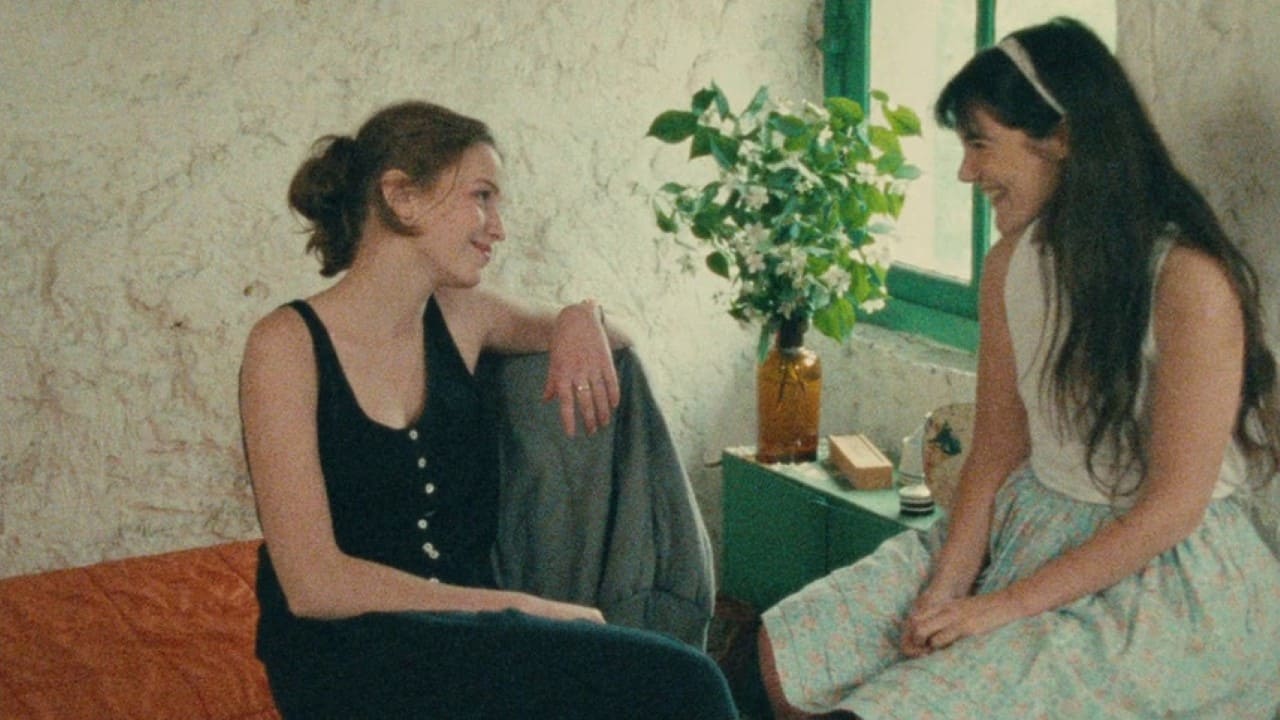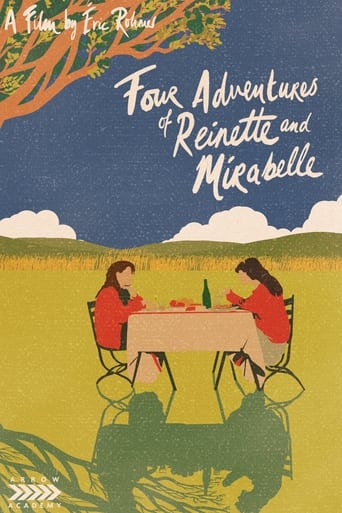filippaberry84
I think this is a new genre that they're all sort of working their way through it and haven't got all the kinks worked out yet but it's a genre that works for me.
Bluebell Alcock
Ok... Let's be honest. It cannot be the best movie but is quite enjoyable. The movie has the potential to develop a great plot for future movies
Zlatica
One of the worst ways to make a cult movie is to set out to make a cult movie.
Darin
One of the film's great tricks is that, for a time, you think it will go down a rabbit hole of unrealistic glorification.
gavin6942
Reinette and Mirabelle are two young women. Reinette lives in the countryside, Mirabelle in Paris. They meet during a holiday of Mirabelle in the country, when Reinette helps her to repair the tube of her bicycle and shows her the beauties of nature and in particular the 'blue hour'.This is the classic meeting of the "city mouse" and the "country mouse". While the country mouse knows such things as how to cook and fix bicycles, she does not concern herself with such high-minded concepts as "ethnology". In her domain, she is the queen.But we also see stories here where it pays to be a smart city mouse... through deception and cunning, you can get what you want in ways the innocent, sincere person never can. The interactions with both the waiter and the art dealer are just so good and really make this film a treasure.
Michael Neumann
A typical Eric Rohmer film is not unlike the ideal croissant: a light and flaky taste of empty calories. His fans don't expect anything more, and will likely find four times the fun in this quartet of mini-parables involving two young pals with very little in common. Reinette is a naive and slightly neurotic child of nature, while Mirabelle is the more demure, sophisticated city girl, and their so-called adventures don't amount to much more than mildly comic pokes at all-too human idiosyncrasies. Each of the four stories exhibits varying degrees of cleverness and charm, but with no binding continuity between them and no real motive or resolution (all part of their appeal, no doubt) the end result is a whimsical but insignificant movie, easy enough to enjoy but difficult to recall in detail twenty minutes later.
Aw-komon
I read in a short critique of Rohmer recently the perfect sentence to describe his work and how to approach it: "It is when we let Rohmer's irony (the incongruence of his characters) be a seed of self-reflection within ourselves that his films take on a transcendent dimension." The transcendent dimension that all great works of art have is there but you have to let the irony become a seed of self-reflection first, you have to actively participate, hence the reason why many people find Rohmer's films boring. They don't even realize what they're missing and don't want to know! The closer a Rohmer film is to soap opera on the surface and the less offbeat it is the more money it makes (the recent "Autumn's Tale" made a very impressive 2 million dollars on the art-house circuit but I, for one, thought it was just o.k.), but ALL of them have depth if you look for it.Rohmer's films slowly and quietly build into elaborate structures of subtly hilarious sophistication which get better with each viewing (letting the irony really take root and become a seed of self-reflection). They are all (on the surface at least) very similar: done low-budget but with quietly superb and magnificent cinematography, maximum conversation, minimum hi-jinks or action, relying on subtlety and the viewer's undivided attention and engagement to reveal their deep humor and depth. All of Rohmer's films make fun of human folly and vanity in a way that's entirely unprecedented, true-to-life, and unique in the cinema. Critics have labeled the term 'classicist' on his head but I don't know of any filmmakers or artists, outside of some of the great satirical novelists of the 19th century, who have approached their subject in this way. There is an incredible amount of pure cinema in Rohmer but done in a way that's completely invisible when the viewer's not seeking it out, absolutely devoid of any tendencies to show-off and draw attention to itself. "Four Adventures of Reinette and Mirabelle" is about two young girls, one a surrealistic-painter from the country, the other-- a law-student from Paris , both very pretty and charming, who strike up a friendship and go through a few neurotic and enlightening incidents together both in the city and the country: trying to wake up at the moment of absolute silence every morning when night-birds stop chirping and morning birds are still asleep; dealing with a rude Paris cafe waiter; dealing with pan-handlers trying to hustle them for change; moral dilemmas about shoplifting; selling Reinette's painting without her having to speak one word to the gallery owner because she's sticking to a vow of silence she made the day before; etc. The Very Funny and valuable results are captured by Rohmer in his trademark, meditative, and un-intrusive style. HIGHLY RECOMMENDED
Jonathan Doron
I think I used the same words about Eric Rohmer's Conte d'hiver, who also directed this movie, about two friends who meet in the country and later live together in Paris, consists of 4 segments. All four slow-paced and totally true to life. The two great actresses, the dialogs and the storylines themselves are all taken out of life, almost documentary-like. I liked the third one the most. It is a true joy to see these two different friends. They are a quiet couple in Paris quite different from the the two friends in also recommended La Vie Revee Des Anges.

